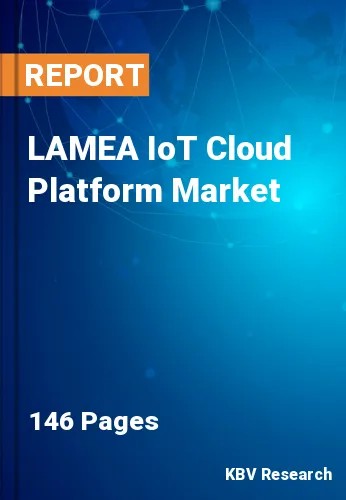The Latin America, Middle East and Africa IoT Cloud Platform Market would witness market growth of 18.2% CAGR during the forecast period (2022-2028).
In order to accelerate the adoption of connectivity of device along with IoT platform connectivity across goods, the demand for secure connecting technologies is continuously rising. Additionally, a robust IoT management platform that provides insight into data usage in real-time, custom content filters, and policy control management for improved multi-network flexibility and security is slowly becoming more in demand, which is fueling the market's expansion.
The majority of IoT platform suppliers also include services that let administrators manage numerous accounts and networks across all devices, as well as easy-to-use firewalls, web filtering, and next-generation virus detection tools. Furthermore, there is a huge market demand for interoperable wireless devices that are small and affordable, which allows for communication between these gadgets and people.
The expansion of many connected devices along with their use in smart cities, smart homes, smart agriculture, smart healthcare, and smart traffic characterize the market environment. Many organizations have received technologies that have assisted them in enabling the IoT through their operations, business processes, and goods as a result of the increased onboarding of corporate brands from the EV and cold supply chain industry. IoT cloud platforms are becoming more important, as seen by the significant investments businesses are making in upgrading their platforms.
Dubai's IoT strategy is to build the most technologically advanced IoT ecosystem in the smartest city in the world to improve living. Government departments are encouraged to participate in the Emirate's smart dynamic transformation and achieve the goal of the Smart Dubai Plan, which is to transition to a 100% paperless government by 2024. High digitalization is being performed as part of their strategy to protect Dubai's digital treasure. Management, acceleration, monetization, government, deployment, and security are included in its six strategic spheres. The expansion of the regional market would experience a rise in the coming future due to the increasing government initiatives in the creation of IoT-based smart environments.
The Brazil market dominated the LAMEA IoT Cloud Platform Market by Country in 2021, and would continue to be a dominant market till 2028; thereby, achieving a market value of $753 Million by 2028.The Argentina market is experiencing a CAGR of 18.9% during (2022 - 2028). Additionally, The UAE market would display a CAGR of 17.9% during (2022 - 2028).
Based on Application, the market is segmented into Industrial Automation & Smart Manufacturing, Smart Infrastructure, Automotive, Healthcare, Retail & E-commerce, BFSI and Others. Based on Organization Size, the market is segmented into Large Size Organizations and Small & Medium Sized Organizations. Based on Offering, the market is segmented into Platform (Without Services) and Services. Based on Platform Type, the market is segmented into Device Management, Connectivity & Communication and Analytics. Based on Deployment Type, the market is segmented into Commercial, Private and Hybrid. Based on countries, the market is segmented into Brazil, Argentina, UAE, Saudi Arabia, South Africa, Nigeria, and Rest of LAMEA.
Free Valuable Insights: The Worldwide IoT Cloud Platform Market is Projected to reach USD 39.8 Billion by 2028, at a CAGR of 14.6%
The market research report covers the analysis of key stake holders of the market. Key companies profiled in the report include Amazon Web Services, Inc. (Amazon.com, Inc.), Microsoft Corporation, Google LLC, Cisco Systems, Inc., IBM Corporation, Oracle Corporation, Salesforce, Inc., Siemens AG, Alibaba Group Holding Limited, and Robert Bosch GmbH.
By Application
By Organization Size
By Offering
By Deployment Type
By Country
Our team of dedicated experts can provide you with attractive expansion opportunities for your business.

